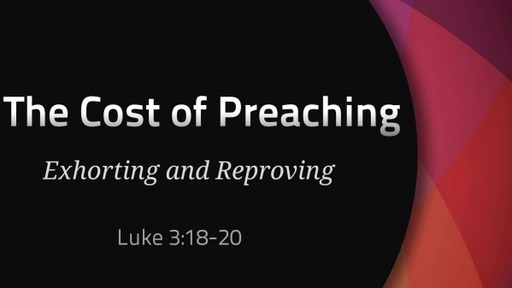The Cost of Preaching

12 Therefore, just as tsin came into the world through one man, and udeath through sin, and vso death spread to all men5 because wall sinned— 13 for sin indeed was in the world before the law was given, but xsin is not counted where there is no law. 14 Yet death reigned from Adam to Moses, even over those whose sinning was not ylike the transgression of Adam, zwho was a type of athe one who was to come.
15 But the free gift is not like the trespass. For if many died through one man’s trespass, much more have the grace of God and the free gift by the grace of that one man Jesus Christ abounded for bmany. 16 And the free gift is not like the result of that one man’s sin. For cthe judgment following one trespass brought condemnation, but the free gift following many trespasses brought djustification. 17 For if, because of one man’s trespass, death reigned through that one man, much more will those who receive the abundance of grace and the free gift of righteousness ereign in life through the one man Jesus Christ.
18 Therefore, as one trespass6 led to condemnation for all men, so one act of righteousness7 leads to justification and life for fall men. 19 For as by the one man’s gdisobedience the many were made sinners, so by the one man’s hobedience the many will be made righteous.
Exhortations and Reproof
(Biblical) Reproving is not popular
Prison and Death are sometimes the vocation of the Preacher
2. (116) Now, some of the Jews thought that the destruction of Herod’s army came from God, and that very justly, as a punishment of what he did against John, that was called the Baptist; (117) for Herod slew him, who was a good man, and commanded the Jews to exercise virtue, both as to righteousness towards one another, and piety towards God, and so to come to baptism; for that the washing [with water] would be acceptable to him, if they made use of it, not in order to the putting away [or the remission] of some sins [only], but for the purification of the body; supposing still that the soul was thoroughly purified beforehand by righteousness. (118) Now, when [many] others came in crowds about him, for they were greatly moved [or pleased] by hearing his words, Herod, who feared lest the great influence John had over the people might put it into his power and inclination to raise a rebellion (for they seemed ready to do anything he should advise), thought it best, by putting him to death, to prevent any mischief he might cause, and not bring himself into difficulties, by sparing a man who might make him repent of it when it should be too late. (119) Accordingly he was sent a prisoner, out of Herod’s suspicious temper, to Macherus, the castle I before mentioned, and was there put to death. Now the Jews had an opinion that the destruction of this army was sent as a punishment upon Herod, and a mark of God’s displeasure against him.